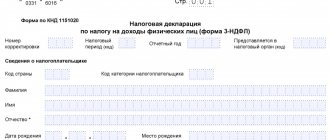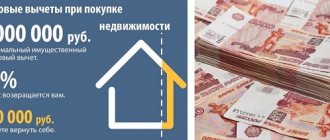What has changed in the procedure for registration and submission of 3-NDFL
Federal Law No. 305-FZ dated July 2, 2021 amended Art. 229 of the Tax Code of the Russian Federation, significant changes that have adjusted the procedure for individuals to submit tax returns in Form 3-NDFL in cases of receiving income from the sale of their property.
According to the current rules, an individual is required to declare income from the sale of property by submitting a declaration to the Federal Tax Service in Form 3-NDFL. This obligation arises if the sold real estate and other property was owned by an individual for less than the minimum maximum period of ownership (3 or 5 years).
In these cases, the tax return must be submitted no later than April 30 of the year following the expired tax period (clause 1 of Article 229 of the Tax Code of the Russian Federation). Otherwise, the individual faces a fine in the amount of 5% of the amount of tax not paid on time, but not less than 1,000 rubles (clause 1 of Article 119 of the Tax Code of the Russian Federation).
In accordance with the amendments, it will not be necessary to file a declaration when selling property for which the minimum period of ownership for the purpose of exemption from personal income tax has not been reached in all cases.
So, if the income received from the sale of this property does not exceed the tax deduction to which an individual is entitled for such transactions (250,000 rubles and 1 million rubles), then this income, according to the new rules, is allowed not to be declared. Accordingly, there will be no need to submit a 3-NDFL declaration to the tax office.
If an individual is still required to submit a return to the Federal Tax Service for the previous tax period, then the corresponding income is simply not reflected in it. Thus, in 3-NDFL declarations, individuals now indicate (paragraph 1, paragraph 4, article 229 of the Tax Code of the Russian Federation):
- all income received during the tax period (except for the income mentioned above), including fixed profit;
- tax deductions;
- sources of payment of income received during the tax period;
- tax amounts withheld by tax agents;
- the amount of advance payments actually paid during the tax period;
- tax amounts subject to payment/additional payment or offset/refund based on the results of the tax period.
Source: RBC Real Estate
In what cases and how much will you have to pay from the sale of real estate in 2021, who has tax benefits, in what cases it does not need to be paid and other nuances
In Russia, income is taxed - if you sell real estate, you must pay tax on the sale. The tax rate for individuals is standard - 13%, but it is paid not on the entire amount of proceeds from the sale, but on the difference between the purchase and sale costs.
We tell you when the obligation to pay personal income tax arises, in which cases sales tax does not require payment and for whom benefits are provided, how the amount of tax is calculated and how to reduce its amount.
Rules for paying tax on the sale of an apartment in 2021
In 2021, a number of changes are being introduced in Russia related to the payment of property taxes for individuals. The main change is that the reform on real estate taxes is being completed, and all regions of Russia this year will finally switch to a new mechanism for calculating taxes based on the cadastral value of the property, which is close to the market value. Previously, in some regions, calculations were maintained based on the inventory value of real estate. This change will lead to an increase in tax payments. In regions that have just switched to the new calculation system, the tax will be levied for the first three years taking into account reducing factors and will increase annually, and after that it will be levied at the full cadastral value.
1. Benefits and recalculation. At the end of 2021, the rules for recalculating previously calculated property taxes for individuals changed. First of all, this applies to pensioners, disabled people, military veterans and other categories of beneficiaries. In accordance with Art. 407 of the Tax Code, they are exempt from paying property tax. The law establishes five types of real estate for which benefits may be granted, including an apartment (room), a residential building and a garage. The benefit is provided in respect of only one object of each type.
2. Benefits for shareholders. From 2021, tax benefits have been extended to shareholders - buyers of apartments in new buildings, participants in housing construction cooperatives (HBC), as well as to those who bought an apartment by assigning rights of claim under an equity participation agreement (DDU). Previously, the countdown of the period of ownership of an apartment began from the moment of registration of ownership of it. According to the new rules, for participants in shared construction, the tenure period will be counted from the moment of full payment of the DDU. This will help shareholders and housing cooperative participants to sell their apartments earlier without paying personal income tax.
3. Real estate will not be subject to increased personal income tax. Last year, Russia adopted a progressive personal income tax rate—income over 5 million rubles. from January 1, 2021 are taxed at a rate of 15%. This may have affected many property owners, but it was decided not to apply the progressive scale to one-time or irregular income, including income from the sale of real estate. Therefore, personal income tax remains the same - 13%.
4. Getting a tax deduction will become easier. In Russia, in 2021 it will be easier to obtain a tax deduction when purchasing an apartment, house or land plot. According to the new rules, individuals will be able to reimburse personal income tax with one application only - without drawing up a 3-NDFL declaration. In addition to significantly reducing the list of required documents, a simplified desk audit will shorten the time frame for obtaining a tax deduction. Now just checking the submitted documents with the Federal Tax Service takes three months, another 30 days will be required to transfer funds to the account. According to the new rules, a desk audit will take 30 days from the date of filing an application for a tax deduction, and money will be transferred to the account within 15 days after its completion.
How to calculate the tax amount
If we talk about the tax on the sale of an apartment, it is calculated using a simple formula: (INCOME FROM THE SALE OF AN APARTMENT - 1 million rubles) * 13% = personal income tax. 1 million rub. – the maximum amount of tax deduction by which income received from the sale of residential houses, apartments, rooms, cottages, garden houses, land plots, as well as shares in the specified property can be reduced.
The tax base is the maximum of two values:
— apartment sale price
- or 70% of the cadastral value of the apartment.
In this case, the cadastral value is determined as of January 1 of the year in which the apartment is sold.
For example, citizen Petrov bought an apartment for 5 million rubles, and sold it for 5.5 million rubles. Thus:
5 500 000 – 1 000 000 = 4 500 000.
Personal income tax: 4,500,000*13% = 585,000 rub.
Deduction in the amount of expenses associated with the purchase of an apartment
In this case, the tax is actually charged only on the profit received from the resale. To do this, real (documented) costs directly related to the purchase are taken into account. In some situations, this solution is more profitable than issuing a deduction.
For example, Petrov sold an apartment for 5 million rubles. (bought for 4.5 million rubles). Thus, the sales tax calculation will look like this:
5 000 000 – 4 500 000 = 500 000.
Personal income tax: 500,000 * 13% = 65,000.
Tax calculator
When income from the sale of an apartment is not taxed
Personal income tax is charged on income, and not on the proceeds from the sale of real estate, and is not charged in the following cases:
- the property was purchased before January 1, 2021, and at the time of sale three years of ownership of the property had passed; — if the apartment was purchased after January 1, 2021, then after five years of ownership, you can sell the property without paying personal income tax; - if the premises were purchased at a higher price and sold at a lower price, but not less than 70% of the cadastral value. The cadastral price is calculated as of January 1 of the year in which the purchase and sale agreement was signed; - the apartment was sold at the same price as it was purchased, and this amount is not less than 70% of the cadastral value.
In all other cases, personal income tax is levied on income from the sale of an apartment.
How to reduce tax on the sale of an apartment
If you sell an apartment, then from the state’s point of view you receive income. If you sell the property before the minimum holding period, you must pay tax on the sale. Russian legislation provides benefits that can significantly reduce the tax base - the amount you were paid for the apartment. Tax will have to be paid not on the entire amount received from the sale of the apartment, but on the difference between the purchase and sale. 13% tax is paid on this amount. Base: pp. 2 p. 2 art. 220 Tax Code of the Russian Federation.
The Tax Code of the Russian Federation provides for several deduction options. To use it, you need to document the costs of purchasing an apartment. To confirm expenses, as a rule, the following documents are provided: a sales contract and an acceptance certificate, cash receipt orders, sales and cash receipts, bank statements, payment orders, receipts from the seller for receipt of funds and others.
Property deduction allows you to reduce the tax base by the amount of income received from the sale of property for a calendar year. The Tax Code of the Russian Federation sets the upper limit of deductions in the amount of 1 million rubles.
That is, if you sold one apartment for 10 million rubles in a year, you can reduce the tax base to 9 million rubles. If you sold two apartments, one for 5 million rubles, the other for 10 million rubles, the total amount of taxable income will be 14 million rubles. (5 million rubles + 10 million rubles – 1 million rubles = 14 million rubles). If your income from the sale of an apartment is less than 1 million rubles, then you do not need to pay personal income tax.
Alexandra Stirmanova, law firm “S&K Vertical”: — The Tax Code of the Russian Federation provides for two deduction options.
1. Apply a deduction in a fixed amount. It should be kept in mind that the fixed tax deduction applies to the owner, not the property. For example, if the owner sold several types of property during the year, then the maximum deduction amount applies to all objects in the aggregate, and not to each individually. To apply the deduction, you must no later than April 30 of the year following the year of sale, provide to the Federal Tax Service at your place of residence a tax return and documents confirming the fact of the sale of the property, as well as documents giving the right to apply a particular deduction.
2. Wait until the minimum tenure period has expired. As an additional option for minimizing the tax burden, we can consider the third option. The most common question that taxpayers have is: when can you avoid paying taxes when selling an apartment? Answer: Personal income tax does not arise when selling an apartment that has been in your ownership for more than the minimum period of ownership established by the Tax Code. As a general rule, the minimum tenure is five years. But it is worth keeping in mind that there are exceptions for certain situations. For example, if ownership was acquired by inheritance or under a gift agreement from a family member and/or close relative of the taxpayer, a three-year tenure period applies.
Various nuances of applying and calculating tax on the sale of an apartment
When calculating the tax on the sale of an apartment, various nuances may arise in its calculation, validity period, benefits and other rules. The lawyer analyzed, using the example of some cases, the rules for calculating and applying personal income tax on real estate of individuals.
Alexandra Voskresenskaya, lawyer at Yukov and Partners: Tax on the sale of an apartment received by inheritance
— When selling real estate received by inheritance, paragraphs. 2 p. 1 art. 228 of the Tax Code of the Russian Federation provides that individuals are required to pay tax on the sale of property owned by them. Objects subject to taxation include real estate. At the same time, Art. 217 of the Tax Code of the Russian Federation provides that citizens are exempt from paying real estate tax if the corresponding object was in their ownership for a minimum period, which as of the current date is three years.
The letter of the Ministry of Finance dated July 30, 2021 No. 03-04-05/66879 explains that for heirs this period begins from the date of registration of their rights in the Unified State Register of Real Estate (on the basis of a certificate of the right to inheritance) regardless of the period during which the real estate the property was previously in the possession of the testator. Also, according to Art. 220 of the Tax Code of the Russian Federation, when selling property after January 1, 2021, citizens have the right to receive a tax deduction based on the amount of documented expenses for the purchase of real estate, but not more than 1 million rubles.
There is a nuance for heirs: a tax deduction can be obtained from expenses incurred by the testator when purchasing real estate, if the testator himself did not independently exercise this right during his lifetime.
Tax on the sale of a mortgaged apartment
When selling an apartment received by inheritance and encumbered with a mortgage, you can receive a tax deduction based on the expenses incurred to repay the mortgage loan (according to the letter of the Ministry of Finance dated August 2, 2021 N 03-04-05/58466). Similar rules apply to cases where real estate was received as a gift. It is necessary, however, to take into account that personal income tax on the sale of real estate received as a gift is not subject to payment if it was donated by a family member (in accordance with the Family Code, these include spouses, parents and children (adoptive parents and adopted children), grandparents and grandchildren, full and half (that is, having a common father or mother) brothers and sisters).
Tax on the sale of a donated apartment
It is also necessary to consider situations when not all real estate, but a share of it, is transferred to the heirs as a gift (by way of inheritance), and subsequently these persons acquire the remaining part of the real estate under a purchase and sale agreement. Here it is necessary to take into account that the minimum period of ownership of real estate for exemption from personal income tax in the event that such real estate was acquired under a compensation agreement is not three years, but five years. Consequently, if the heir received part of the apartment by inheritance, and part - under a purchase and sale agreement, and less than five years have passed from the date of registration of the right to the entire apartment in the Unified State Register of Real Estate, such a person must pay personal income tax in proportion to the share acquired under the purchase and sale agreement.
In accordance with Art. 407 of the Tax Code, pensioners receiving pensions assigned in the manner established by pension legislation, as well as persons who have reached the age of 60 and 55 years (men and women, respectively), who, in accordance with the legislation of Russia, are paid a monthly lifelong maintenance, are exempt from paying personal income tax.
How to get a tax deduction from the sale of an apartment
Property tax deductions associated with the sale of real estate can be applied unlimitedly. But there is a limitation - the maximum deduction amount is 1 million rubles. or 250 thousand rubles. in the tax period.
In order to exercise the right to deduction, the taxpayer must:
— fill out a tax return at the end of the year (form 3-NDFL); — prepare copies of documents confirming the fact of sale of property. These may be copies of property purchase and sale agreements, exchange agreements, etc.; - if the taxpayer claims a deduction in the amount of expenses directly related to the acquisition of the property being sold, additionally - prepare copies of documents confirming such expenses (cash receipts, sales and cash receipts, bank statements, payment orders, receipts from the seller for receipt of funds, etc.). etc.), as well as other documents confirming the fact of acquisition of the apartment being sold, for example, a purchase and sale agreement; — you can submit a declaration to the tax office, copies of documents (you must have the originals with you) can be submitted at your place of residence or through the taxpayer’s personal account for individuals.
Tags: tax deduction, personal income tax, 2021, real estate
Cancellation of the obligation to submit 3-NDFL
According to the new rules, if the property tax deduction for personal income tax is equal to or exceeds the amount of income received from the sale of property owned by an individual for less than the minimum period of ownership, the 3-NDFL declaration will not be submitted to the tax office.
Taking into account these changes, the obligation to submit 3-NDFL is canceled for the following cases (paragraph 3–5, paragraph 4, article 229 of the Tax Code of the Russian Federation):
- upon receipt of income from the sale of residential houses, apartments, rooms (including privatized housing), garden houses and land plots, not exceeding a total of 1 million rubles;
- upon receipt of income from the sale of other real estate (non-residential real estate, garages, parking spaces, etc.) not exceeding a total of 250,000 rubles;
- when receiving income from the sale of other property, for example, cars (except for securities), which were owned by the taxpayer for less than 3 years, not exceeding a total of 250,000 rubles.
Moreover, if the income from the sale of property exceeds the amount of the corresponding deductions (1 million rubles and 250,000 rubles), then the obligation to submit a declaration in form 3-NDFL to the inspectorate remains.
The new rules apply to income received by taxpayers in tax periods starting from January 1, 2021 (Article 10 of Federal Law No. 305-FZ dated July 2, 2021).









